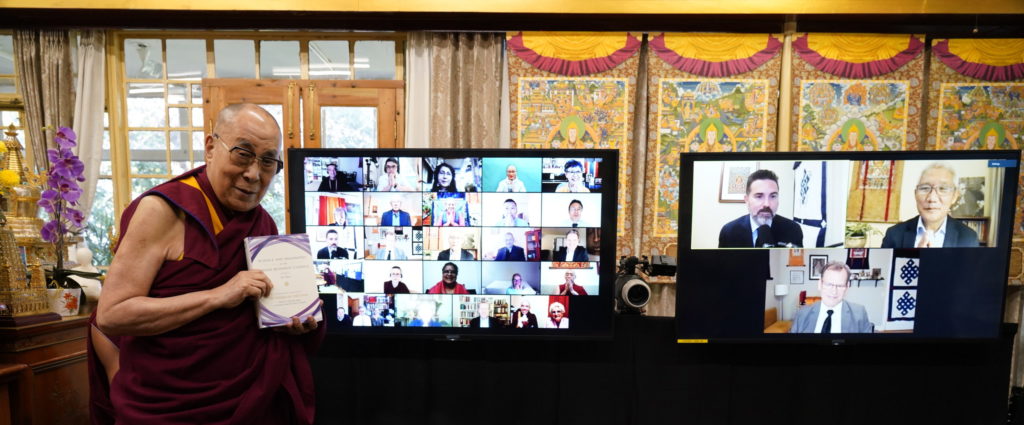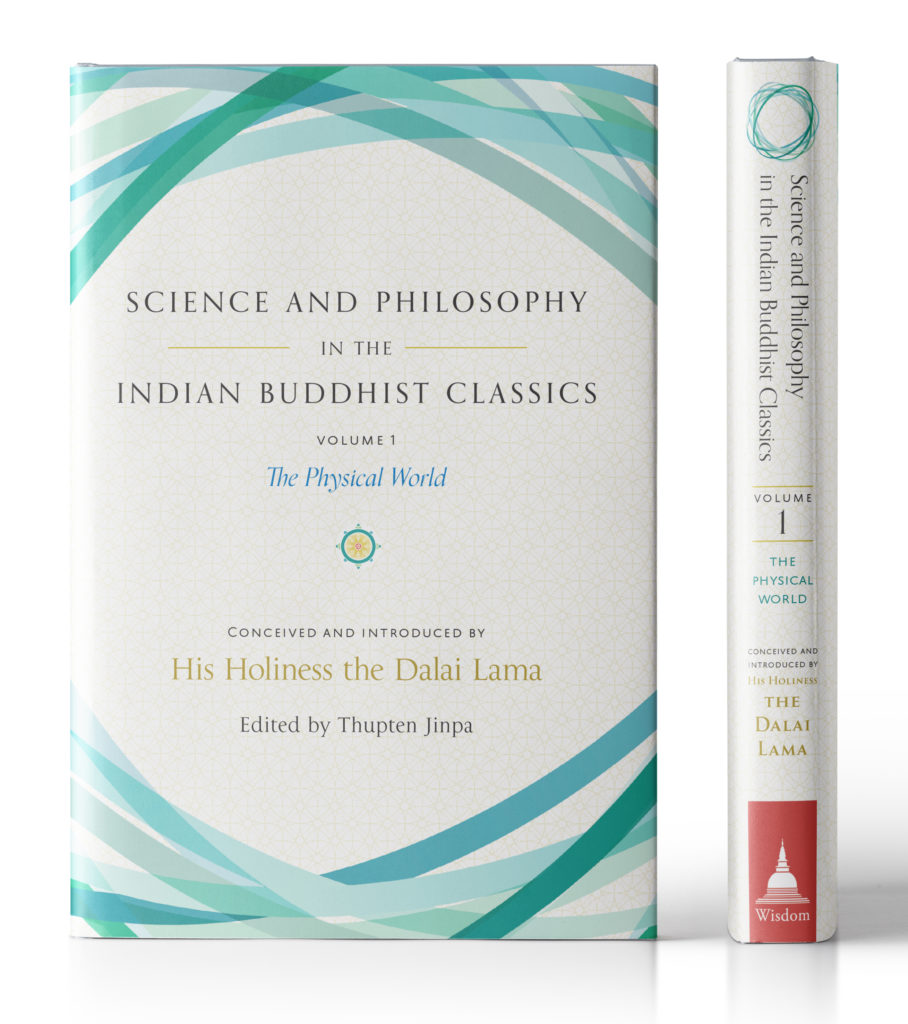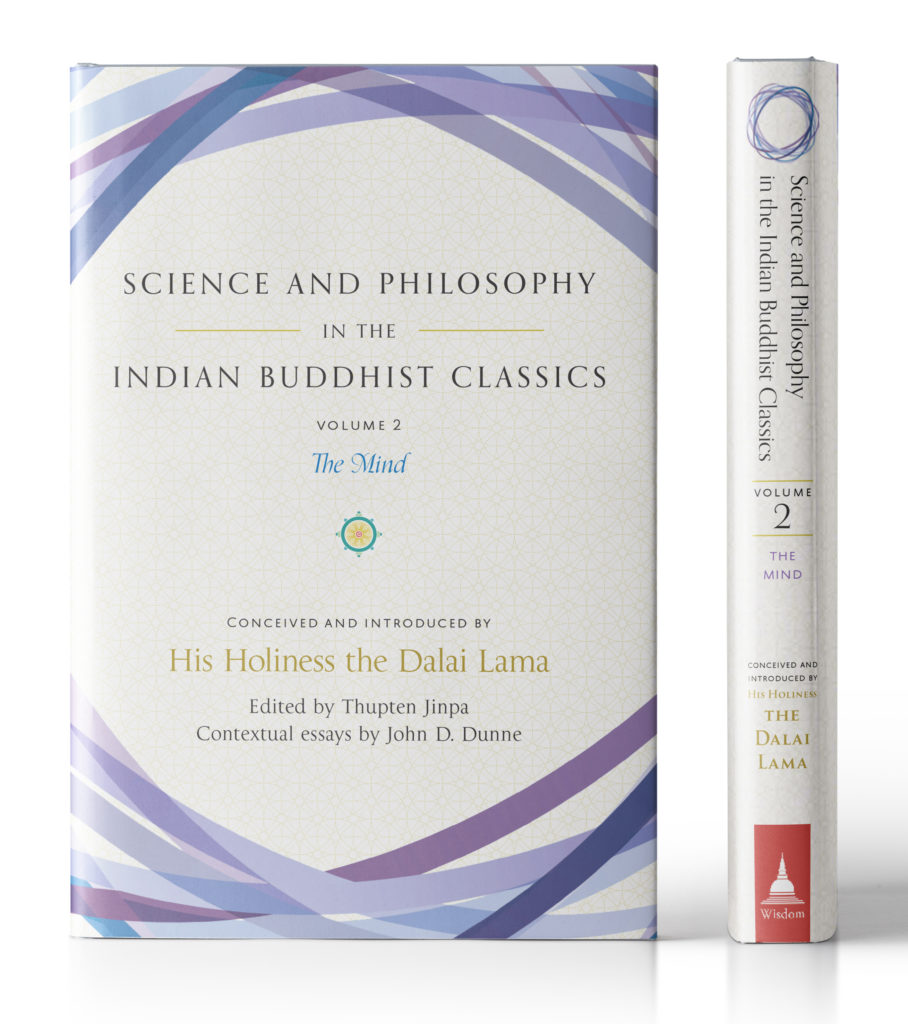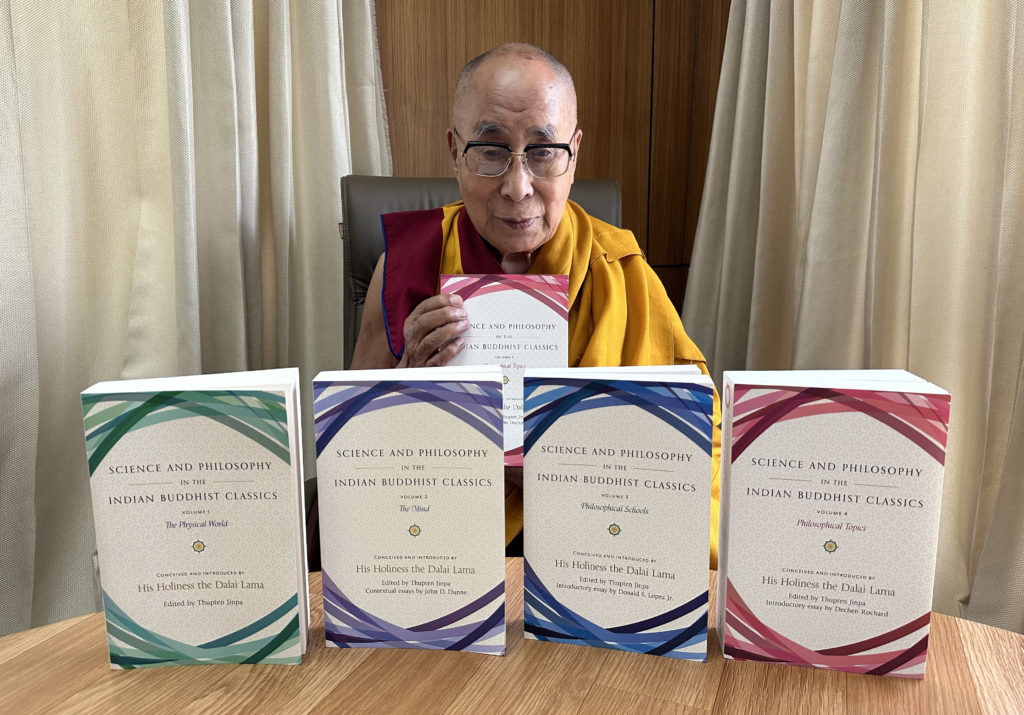 Science and Philosophy in the Indian Buddhist Classics compiles classical Buddhist explorations of the nature of our material world, the human mind, logic, and phenomenology and puts them into context for the modern reader.
Science and Philosophy in the Indian Buddhist Classics compiles classical Buddhist explorations of the nature of our material world, the human mind, logic, and phenomenology and puts them into context for the modern reader.
This ambitious four-volume series—a major resource for the history of ideas and especially the history of science and philosophy—has been conceived by and compiled under the visionary supervision of His Holiness the Dalai Lama himself. It is his view that the exploratory thinking of great Indian masters in the first millennium CE still has much that is of interest to us today, whether we are Buddhist or not. These volumes make those insights accessible.
All the volumes in the series are available. We hope you enjoy this series as much as we do!
Book Launch
We hope you were able to join us for the online book launch with His Holiness the Dalai Lama and other important guests celebrating the release Volume 2: The Mind. If you were unable to attend or want to watch it again you can watch the recording here.

Volume 1, The Physical World, explores the nature of our material world—from the macroscopic to the microscopic. It begins with an overview of the many frameworks, such as the so-called five aggregates, that Buddhist thinkers have used to examine the nature and scope of reality. Topics include sources of knowledge, the scope of reason, the nature and constituents of the material world, theories of the atom, the nature of time, the formation of the universe, and the evolution of life, including a detailed explanation of the early Buddhist theories on fetal development. The volume even contains a brief presentation on early theories about the structure and function of the brain and the role of microorganisms inside the human body. The book weaves together passages from the works of great Buddhist thinkers such as Asaṅga, Vasubandhu, Nāgārjuna, Dignāga, and Dharmakīrti. Each of the major topics is introduced by Thupten Jinpa, the Dalai Lama’s principal English-language translator and founder of the Institute of Tibetan Classics.
The second volume, The Mind, focuses on the science of mind. Readers are first introduced to Buddhist conceptions of mind and consciousness and then led through traditional presentations of mental phenomena to reveal a Buddhist vision of the inner world with fascinating implications for the contemporary disciplines of cognitive science, psychology, emotion research, and philosophy of mind. Major topics include
– The distinction between sensory and conceptual processes and the pan-Indian notion of mental consciousness
– Mental factors—specific mental states such as attention, mindfulness, and compassion—and how they relate to one another
– The unique tantric theory of subtle levels of consciousness, their connection to the subtle energies, or “winds,” that flow through channels in the human body, and what happens to each when the body and mind dissolve at the time of death
– The seven types of mental states and how they impact the process of perception
– Styles of reasoning, which Buddhists understand as a valid avenue for acquiring sound knowledge
In the final section, the volume offers what might be called Buddhist contemplative science, a presentation of the classical Buddhist understanding of the psychology behind meditation and other forms of mental training.
To present these specific ideas and their rationale, the volume weaves together passages from the works of great Buddhist thinkers like Asaṅga, Vasubandhu, Nāgārjuna, Dignāga, and Dharmakīrti. His Holiness the Dalai Lama’s introduction outlines scientific and philosophical thinking in the history of the Buddhist tradition. To provide additional context for Western readers, each of the six major topics is introduced with an essay by John D. Dunne, distinguished professor of Buddhist philosophy and contemplative practice at the University of Wisconsin. These essays connect the traditional material to contemporary debates and Western parallels, and provide helpful suggestions for further reading.
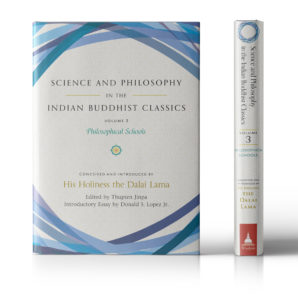 In the third volume, Philosophical Schools, the focus turns to exploring the philosophical schools of India. The practice of presenting the views of various schools of philosophy dates back to the first millennium in India, when proponents of competing traditions would arrange the diverse sets of philosophical positions in a hierarchy culminating in their own school’s superior tenets. Centuries later, relying on the Indian Buddhist treatises, Tibet developed its own tradition of works on tenets (grub mtha’), often centered on the four schools of Buddhist philosophy, using them to demonstrate the philosophical evolution within their own tradition, and within individual practitioners, as they progressed through increasingly more subtle expressions of the true reality.
In the third volume, Philosophical Schools, the focus turns to exploring the philosophical schools of India. The practice of presenting the views of various schools of philosophy dates back to the first millennium in India, when proponents of competing traditions would arrange the diverse sets of philosophical positions in a hierarchy culminating in their own school’s superior tenets. Centuries later, relying on the Indian Buddhist treatises, Tibet developed its own tradition of works on tenets (grub mtha’), often centered on the four schools of Buddhist philosophy, using them to demonstrate the philosophical evolution within their own tradition, and within individual practitioners, as they progressed through increasingly more subtle expressions of the true reality.
The present work follows in this venerable tradition, but with a modern twist. Like its predecessors, it presents the views of seven non-Buddhist schools, those of the Samkhya, Vaisesika, Nyaya, Mimamsa, Vedanta, Jaina, and Lokayata, followed by the Buddhist Vaibhasika, Sautrantika, Cittamatra, and Madhyamaka schools, arranging them like steps on a ladder to the profound. But rather than following in the sharply polemical approach of its ancient predecessors, it strives to survey each tradition authentically, relying on and citing the texts sacred to each, allowing the different traditions to speak for themselves. What, it asks, are the basic components of the world we experience? What is the nature of their ultimate reality? And how can we come to experience that for ourselves? See how the rich spiritual traditions of India approached these key questions, where they agreed, and how they evolved through dialogue and debate.
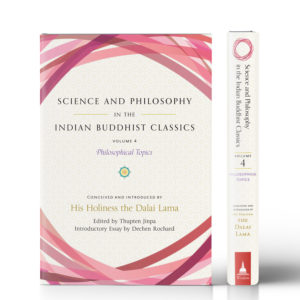 Philosophical Topics, the fourth and final Science and Philosophy in the Indian Buddhist Classics volume provides, through extensive passages, a window into the works of the great thinkers from the flowering of philosophy in classical India.
Philosophical Topics, the fourth and final Science and Philosophy in the Indian Buddhist Classics volume provides, through extensive passages, a window into the works of the great thinkers from the flowering of philosophy in classical India.
This is the second philosophy volume in the Science and Philosophy series. Whereas the first philosophy volume presented the views of the non-Buddhist and Buddhist schools in sequence, the present works selects specific topics for consideration, including the nature of the two truths, the analysis of self, the Yogacara explanation of reality, emptiness in the Madhyamaka tradition, a survey of logic and epistemology, and the Buddhist explanation of language and meaning. Like earlier volumes, it provides, through extensive extracts, a window into the works of the masters of the Nalanda tradition. The final section on language is particularly unique and largely crafted by Thupten Jinpa.


His Holiness the Dalai Lama is the spiritual leader of the Tibetan people, a Nobel Peace Prize recipient, and a beacon of inspiration for Buddhists and non-Buddhists alike. He is admired also for his more than four decades of systematic dialogues with scientists exploring ways to develop new evidence-based approaches to alleviating suffering and promoting human flourishing. He is the co-founder of the Mind and Life Institute and has helped to revolutionize the traditional Tibetan monastic curriculum by incorporating the teaching of modern science. He is a great champion of the great Indian Nalanda tradition of science, philosophy, and wisdom practices.

Thupten Jinpa is a well-known Buddhist scholar and has been the principal English-language translator for His Holiness the Dalai Lama for more than three decades. A former monk and a geshe lharampa (equivalent to a doctorate in divinity), he also holds a BA in philosophy and a PhD in religious studies, both from Cambridge University. He is the author and translator of many books and teaches at McGill University in Montreal.
Compendium Compilation Committee
Chair: Thamthog Rinpoche, Abbot of Namgyal Monastery
General Series Editor: Thupten Jinpa, PhD
Advisory Members:
Geshe Yangteng Rinpoche, Sermey Monastic College
Geshe Thupten Palsang, Drepung Loseling College
Gelong Thupten Yarphel, Namgyal Monastery
Editors
Geshe Jangchup Sangye, Ganden Shartse College
Geshe Ngawang Sangye, Drepung Loseling College
Geshe Chisa Drungchen Rinpoche, Ganden Jangtse College
Geshe Lobsang Khechok, Drepung Gomang College
Volume 1: The Physical World
Ian James Coghlan (Jampa Ignyen) trained as a monk at Jé College, Sera Monastic University, completing his studies in 1995, and holds a PhD in Asian studies from La Trobe University. He has translated and edited a number of works from Tibetan including Principles of Buddhist Tantra (with Kirti Tsenshap Rinpoché and Voula Zarpani); Hundreds of Deities of Tusita, An Offering Cloud of Nectar, and Stairway to the State of Union (with Choden Rinpoché and Voula Zarpani). Currently he is a translator for the Institute of Tibetan Classics and an adjunct research fellow at SOPHIS, Monash University.
Volume 2: The Mind
Dechen Rochard has a BA in philosophy from the University of London and a PhD in Buddhist philosophy from the University of Cambridge. She also completed the first ten years of the geshe degree program at the Institute of Buddhist Dialectics in Dharamsala, India, including the study of Madhyamaka. She is currently translating texts for the Gaden Phodrang Foundation and is a fellow of the Dalai Lama Centre for Compassion (Oxford) and an honorary fellow of the University of Bristol. Other books by Dechen Rochard include Science and Philosophy in the Indian Buddhist Classics, Vol. 4.
John D. Dunne serves on the faculty of the University of Wisconsin-Madison, where he holds the Distinguished Chair in Contemplative Humanities at the Center for Healthy Minds. He is also chair of the Department of Asian Languages & Cultures. His work focuses on Buddhist philosophy and contemplative practice, especially in dialog with Cognitive Science and Psychology. His more than fifty publications appear in venues ranging across both the Humanities and the Sciences, including Foundations of Dharmakīrti’s Philosophy (2004) and Science and Philosophy in the Indian Buddhist Classics: The Mind (2020). John Dunne speaks in both academic and public contexts, and he occasionally teaches for Buddhist communities. His broader engagements include being a Fellow of the Mind and Life Institute, where he was previously a member of the Board of Directors, and serving as an academic advisor to the Rangjung Yeshe Institute in Kathmandu, Nepal.
Volume 3: Philosophical Schools
Don Lopez, Jr. is the Arthur E. Link Distinguished University Professor of Buddhist and Tibetan Studies in the Department of Asian Languages and Cultures at the University of Michigan. He is the author and translator of numerous books, including Beautiful Adornment of Mount Meru, Opening the Eye of New Awareness, and In the Forest of Faded Wisdom: 104 Poems by Gendun Chopel (University of Chicago 2009).
Volume 4: Philosophical Topics
Dechen Rochard has a BA in philosophy from the University of London and a PhD in Buddhist philosophy from the University of Cambridge. She also completed the first ten years of the geshe degree program at the Institute of Buddhist Dialectics in Dharamsala, India, including the study of Madhyamaka. She is currently translating texts for the Gaden Phodrang Foundation and is a fellow of the Dalai Lama Centre for Compassion (Oxford) and an honorary fellow of the University of Bristol. Other books by Dechen Rochard include Science and Philosophy in the Indian Buddhist Classics, Vol. 2.

